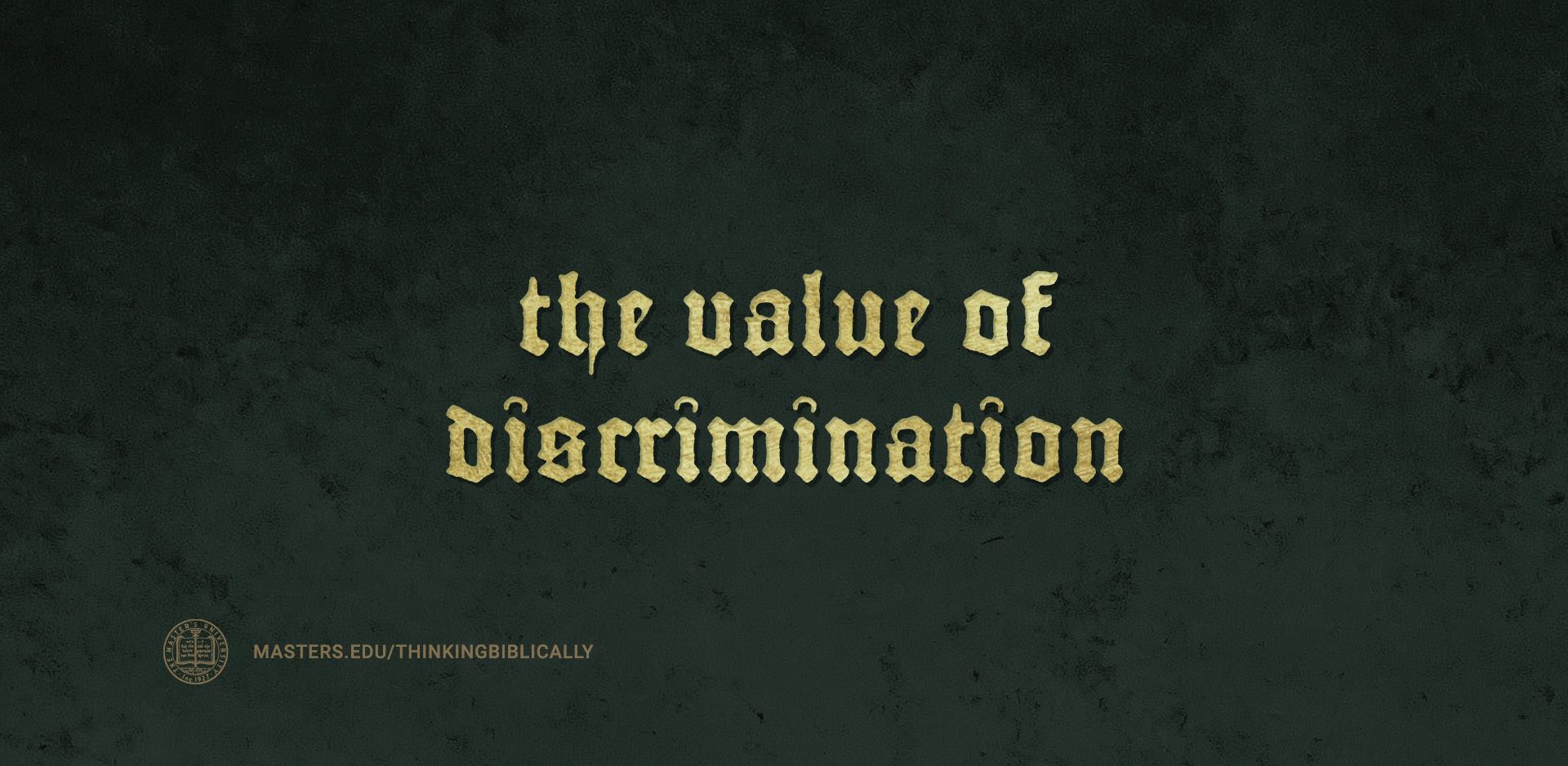
That’s discrimination!
What immediately comes to mind when you hear that phrase? It’s almost always a pejorative in the modern vernacular, and never confused with a compliment.
To be accused of discrimination nowadays is overwhelmingly synonymous with the sin of partiality—showing preference for people on the basis of gender, skin color, wealth, or social standing. But the word itself is not negative. Discriminate simply means “to make a clear distinction.” We used to call someone a “discriminating person” if he or she exercised keen judgment.
“Discrimination” signified a positive ability to draw the line between good and evil, true and false, right and wrong. In the heyday of the American civil rights movement the word was widely applied to racial bigotry. And, indeed, people who make unfair distinctions between races are guilty of an evil form of discrimination.
Unfortunately, the word itself took on that negative connotation, and the sinister implication is often transferred to anyone who tries to discriminate in any way. To view homosexuality as immoral (1 Corinthians 6:9-10; 1 Timothy 1:9-10) is condemned now by the politically correct as an unacceptable form of discrimination. To suggest that wives ought to submit to their own husbands (Ephesians 5:22; Colossians 3:18) is now classified as unfair discrimination. To suggest that children ought to obey their parents (Ephesians 6:1) is also labeled unjust discrimination by some. Anyone who “discriminates” in these ways risks becoming a target of lawsuits by the ACLU.
The idea of discrimination itself has fallen out of favor. We are not supposed to draw lines. We are not supposed to discriminate. That is the spirit of this age, and unfortunately, it has crept into the church. If we are going to be discerning people, we must develop the skill of discriminating between truth and error, good and bad. The original languages of Scripture convey this very idea. The main Hebrew word for “discernment” is bin. The word and its variants are used hundreds of times in the Old Testament. It is often translated “discernment,” “understanding,” “skill,” or “carefulness.” But in the original language it conveys the same idea as our word discrimination. It entails the idea of making distinctions. Jay Adams points out that the word bin
is related to the noun bayin, which means “interval” or “space between,” and the preposition ben, “between.” In essence it means to separate things from one another at their points of difference in order to distinguish them.
Discernment, then, is a synonym for discrimination. In fact, the Greek verb translated “discern” in the New Testament is diakrinō. It means, “to make a distinction” and is literally translated that way in Acts 15:9.
So discernment is the process of making careful distinctions in our thinking about truth. The discerning person is the one who draws a clear contrast between truth and error. Discernment is black-and-white thinking—the conscious refusal to color every issue in shades of gray. No one can be truly discerning without developing skill in separating divine truth from error.
Does Scripture tell us how to be discerning? It certainly does. Paul sums up the process in 1 Thessalonians 5:21-22: “Examine everything carefully; hold fast to that which is good; abstain from every form of evil.” There, in three straightforward commands, he spells out the requirements of a discerning mind.

The Master’s University and Seminary admit students of any race, color, national and ethnic origin to all the rights, privileges, programs, and activities generally accorded or made available to students at the school. It does not discriminate on the basis of race, color, national and ethnic origin in the administration of its educational policies, admissions policies, scholarship and loan programs, and athletic and other school-administered programs.
21726 Placerita Canyon Road
Santa Clarita, CA 91321
1-800-568-6248
© 2025 The Master’s University Privacy Policy Copyright Info
| Cookie | Duration | Description |
|---|---|---|
| cookielawinfo-checkbox-analytics | 11 months | This cookie is set by GDPR Cookie Consent plugin. The cookie is used to store the user consent for the cookies in the category "Analytics". |
| cookielawinfo-checkbox-functional | 11 months | The cookie is set by GDPR cookie consent to record the user consent for the cookies in the category "Functional". |
| cookielawinfo-checkbox-necessary | 11 months | This cookie is set by GDPR Cookie Consent plugin. The cookies is used to store the user consent for the cookies in the category "Necessary". |
| cookielawinfo-checkbox-others | 11 months | This cookie is set by GDPR Cookie Consent plugin. The cookie is used to store the user consent for the cookies in the category "Other. |
| cookielawinfo-checkbox-performance | 11 months | This cookie is set by GDPR Cookie Consent plugin. The cookie is used to store the user consent for the cookies in the category "Performance". |
| viewed_cookie_policy | 11 months | The cookie is set by the GDPR Cookie Consent plugin and is used to store whether or not user has consented to the use of cookies. It does not store any personal data. |
Notifications